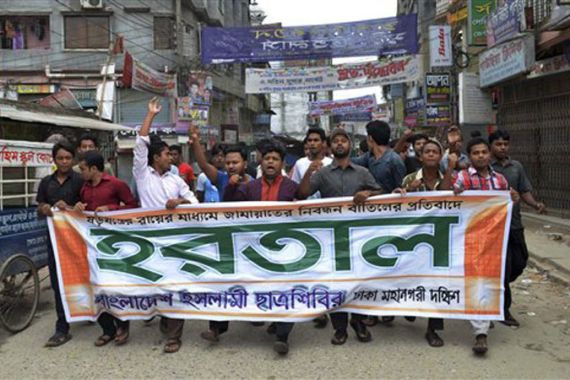Bangladesh strike enters second day
Jamaat-e-Islami supporters stage protests against death sentence handed to one of its top leaders for 1971 war crimes.

A nationwide strike in Bangladesh has entered a second day after a senior Islamist leader was handed the death sentence for crimes committed during the country’s 1971 war of independence against Pakistan.
Thursday’s strike was the latest to hit Bangladesh, which has been reeling from deadly violence over the sentences given to Jamaat-e-Islami party members for atrocities committed during the independence war.
Protests erupted across the country on Wednesday leaving one person dead, police said.
Supporters of Jamaat-e-Islami hurled bricks and small, home-made bombs during protests in southern and northern Bangladesh, while police retaliated with rubber bullets and tear gas, officers said.
A police officer was shot and seriously wounded by activists who attacked a police camp near the port city of Chittagong, a senior police officer said.
Molla death sentence
The violence came as towns and cities shut down for the strike called by the Jamaat-e-Islami party over the death sentence handed on Tuesday to Abdul Quader Molla for mass murder during the war of independence.
An auto-rickshaw driver died after being hit with stones in the southern coastal district of Noakhali as Jamaat activists protested Molla’s sentence, which they say is politically motivated.
On Tuesday, the Supreme Court enhanced the sentence originally given to Molla by the country’s war crimes tribunal, and rejected an appeal for acquittal by his defence lawyers.
Molla, 65, the fourth-highest leader of Jamaat, had been given a life sentence in February by the tribunal.
Molla was convicted of rape, murder and mass murder including the killing of more than 350 unarmed Bengali civilians, a poet and a top journalist during the war, when he was a physics student at Dhaka University.
Prosecutors described him as the “Butcher of Mirpur”, a Dhaka suburb where he committed most of the atrocities.
The tribunal has since January convicted six Islamists of crimes related to the 1971 war, in which pro-independence fighters battled Pakistani forces.
Jamaat sided with Pakistan during the liberation struggle, but denies any role in the atrocities.
The opposition has criticised the trials as a politically motivated exercise aimed at settling old scores rather than meting out justice.
An estimated 300,000 people were killed and 250,000 women raped during the nine-month-old liberation war.